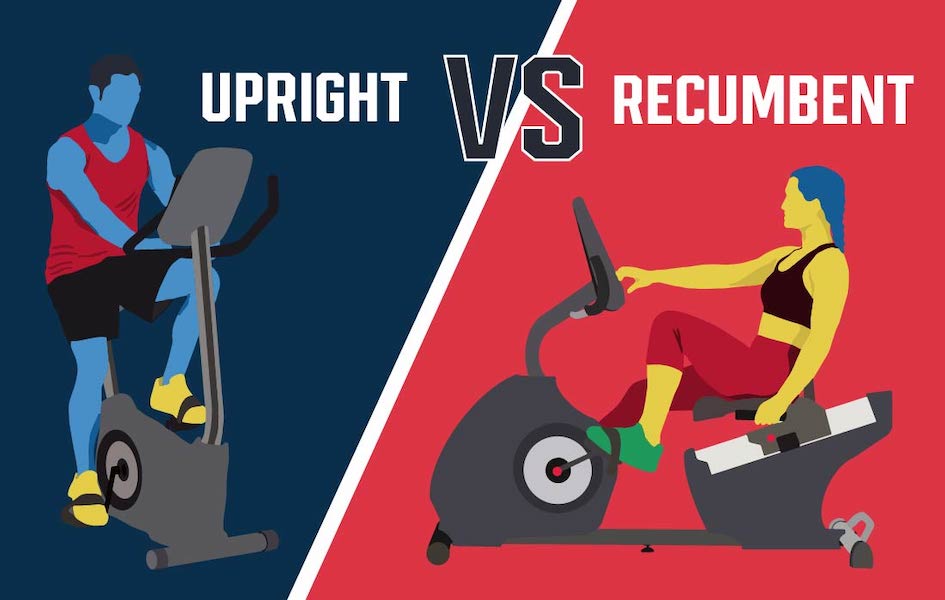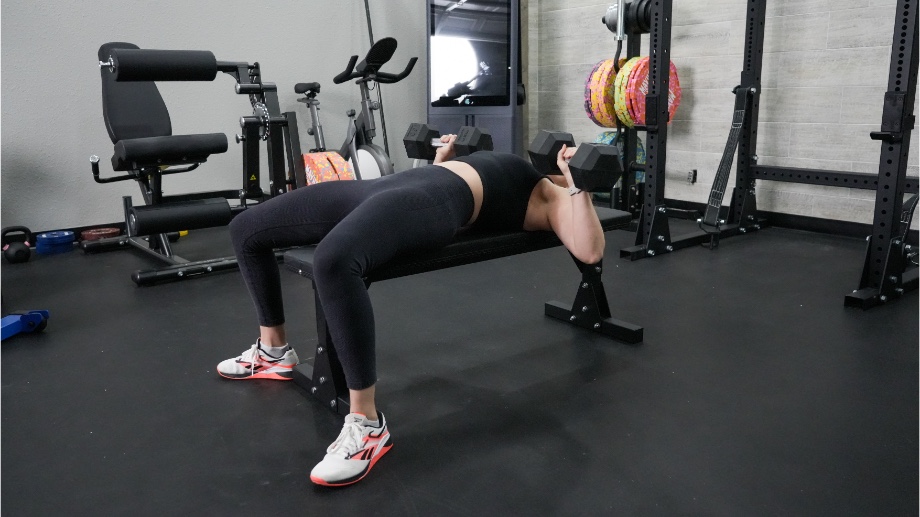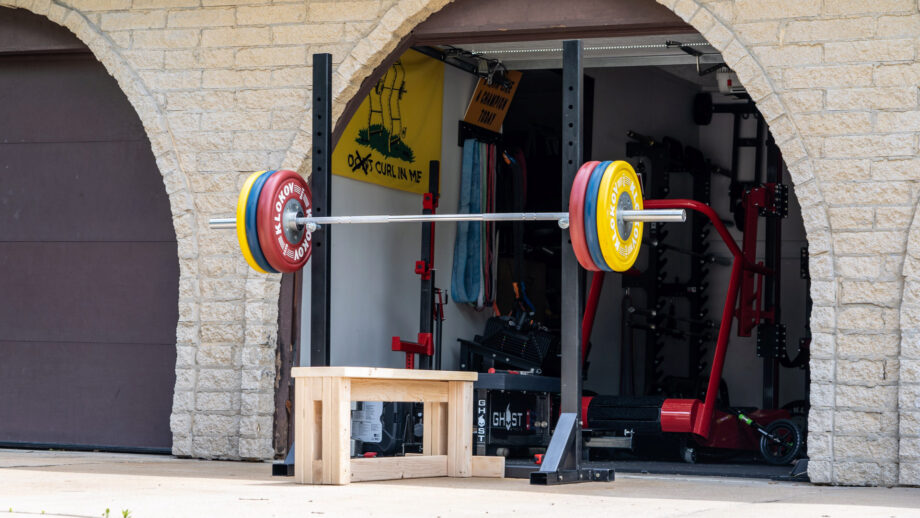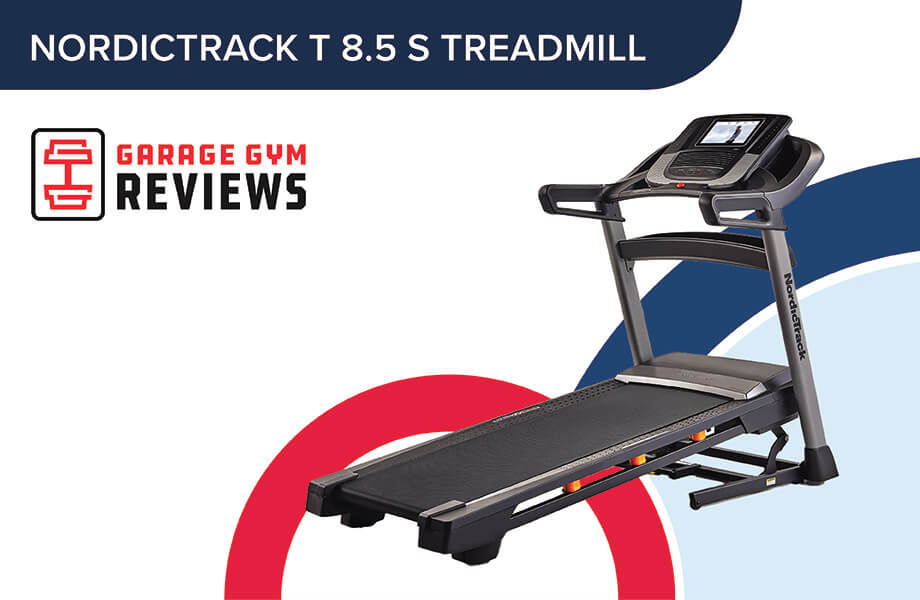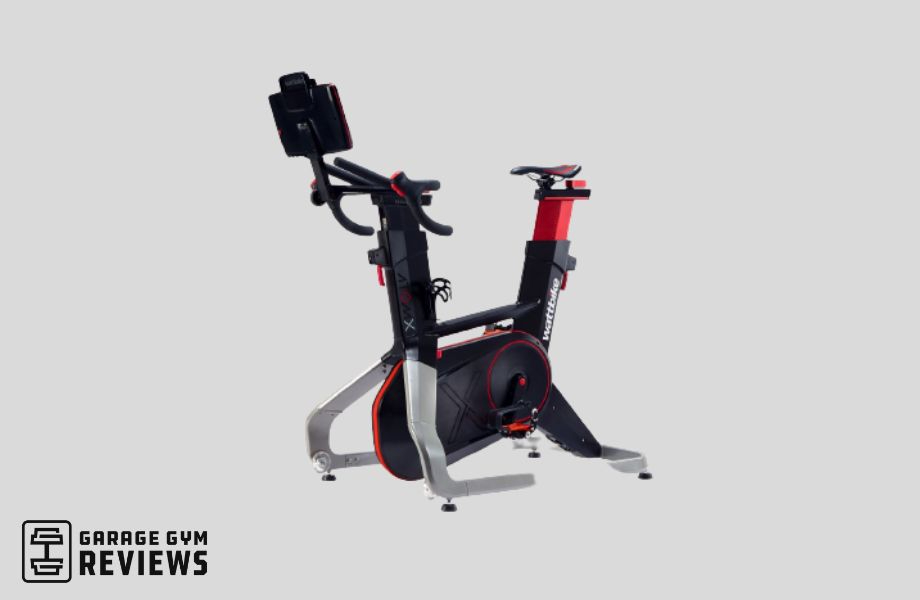As a home gym owner, having cardio equipment gives you a low barrier to meet the recommended amount of 150 minutes of moderate aerobic activity each week. You may be considering an exercise bike vs treadmill, or maybe an elliptical. There are benefits to all of them, and choosing the right option for you is highly individualized.
This article will focus on the exercise bike and guide you through all the stationary bike benefits, plus define recumbent bike vs upright bike differences; what’s the deal between the two bikes anyway?
The main difference between these two styles of exercise bikes is the riding position. Recumbent bikes offer riders a comfortable and supported seated position, similar to sitting in an office chair. Upright bikes are more similar to a traditional outdoor bike, where you mount the bike and your upper body is not supported by a back rest.
The best exercise bike for your home gym is going to differ depending on your needs. We’ll break it down below.
Recumbent Bike Vs Upright Bike Video Comparison

What Is A Recumbent Bike?
The recumbent bike has a different feel than sitting on an upright bike or pedaling a bicycle on the road. The reclined position allows riders to sit in a cushioned seat with a backrest. The position alleviates strain on the back and glutes.
Unlike an upright bike with the pedals directly under the hips, the recumbent’s pedals are out in front of the seat, making the pedaling movement entirely different because your legs will be in front of you. This position will require a significant amount of hip flexion and knee bend, making the focus of this type of exercise bike almost entirely on the lower body.
RELATED: Best Recumbent Bike
Pros:
- Less saddle soreness
- Easy to get on and off
- Provides lower back support
- Low-impact leg workout
Cons:
- Big footprint
- Don’t normally fold
- No full-body muscle engagement
- Less intense workout overall
Best For:
The recumbent bike is a good choice for you if you want to put less stress on the knee and hip joints.
“The recumbent bike can be a good choice for older adults, or if you’re someone who struggles with balance,” explains Nicole Davis, GGR’s editor and ACE-Certified Personal Trainer. “Beyond the added back support, the recumbent bike is lower to the ground and doesn’t require you to mount the riding saddle.”
Recumbent Bikes We Recommend:
Our product testers have ridden dozens of exercise bikes and researched dozens more. Here’s what we’d recommend for recumbent bikes.
Schwinn 270 Recumbent Bike
Schwinn 270 Recumbent Bike
Schwinn 270 Recumbent Bike
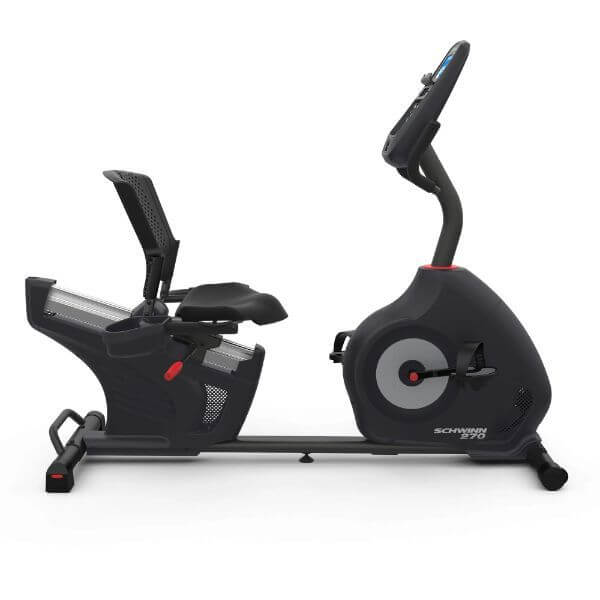
Product Highlights
- Recumbent bike that uses magnetic resistance
- 25 levels of resistance
- Features a dual track, two-LCD screen system
- 29 pre-programmed workouts
- Requires some dedicated floor space
Pros & Cons
Pros
- 29 programs
- 4-user capacity
- USB port
- Compatibility with Explore the World app and MyFitnessPal
- Easy to use
Cons
- Lacks technology features
- Friction resistance bikes generally require more maintenance than magnetic
Bottom Line
The Schwinn 270 may be one of the brand’s older models of recumbent bikes, but it still comes with a variety of basic, yet motivating features. There are some complaints about it breaking down (specifically the resistance) and, given the limited warranty, this is a viable concern.
Schwinn is a longstanding name in the world of fitness equipment, and its 270 Recumbent Bike has plenty of the features we’d look for, including ease of use, two LCD screens that display 13 different metrics, plus built-in programming and compatibility with the Explore the World app for interactive programming.
Exerpeutic 400XL Folding Recumbent Bike
Exerpeutic 400XL Folding Recumbent Bike
Exerpeutic 400XL Folding Recumbent Bike
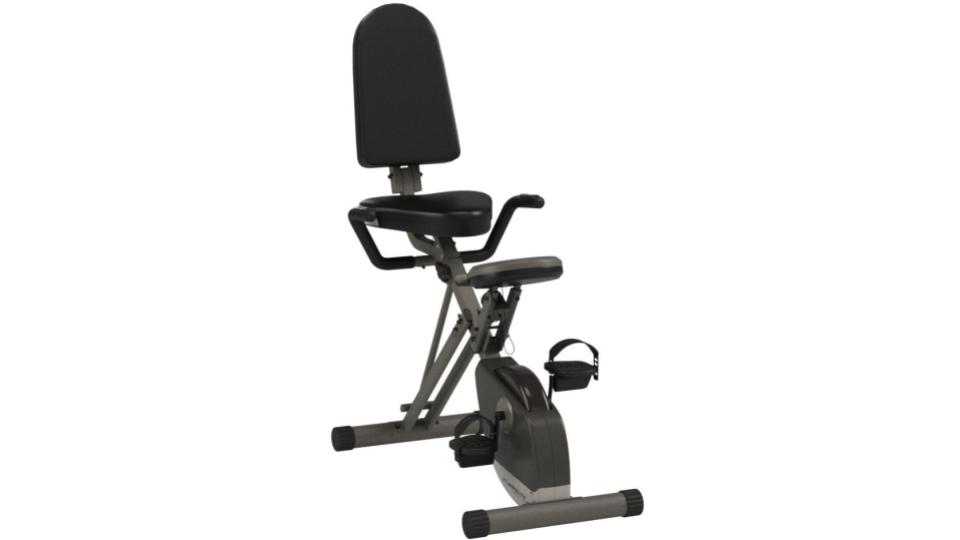
Product Highlights
- Foldable recumbent bike
- Small footprint
- 300-lb weight capacity
- Wide seat with backrest
Pros & Cons
Pros
- Low-impact for joints
- Wide seat
- Adjustable backrest
- Sturdy and stable
- Lightweight
Cons
- Assembly can be tough
- Not a traditional walk-through design
- Longer than other folding bikes due to recumbent position
- No water bottle holder
- No device holder
Bottom Line
This recumbent bike is surprisingly sturdy, lightweight, and folding exercise bike. It does not require a power outlet and can be used at an adjustable height workstation desk.
From its foldability to its small footprint, the Exerpeutic 400XL folding bike minimizes concerns about having the space for a recumbent bike. This recumbent bicycle would be an appropriate choice for casual cycling.
ProForm Hybrid Trainer
ProForm Hybrid Trainer
ProForm Hybrid Trainer
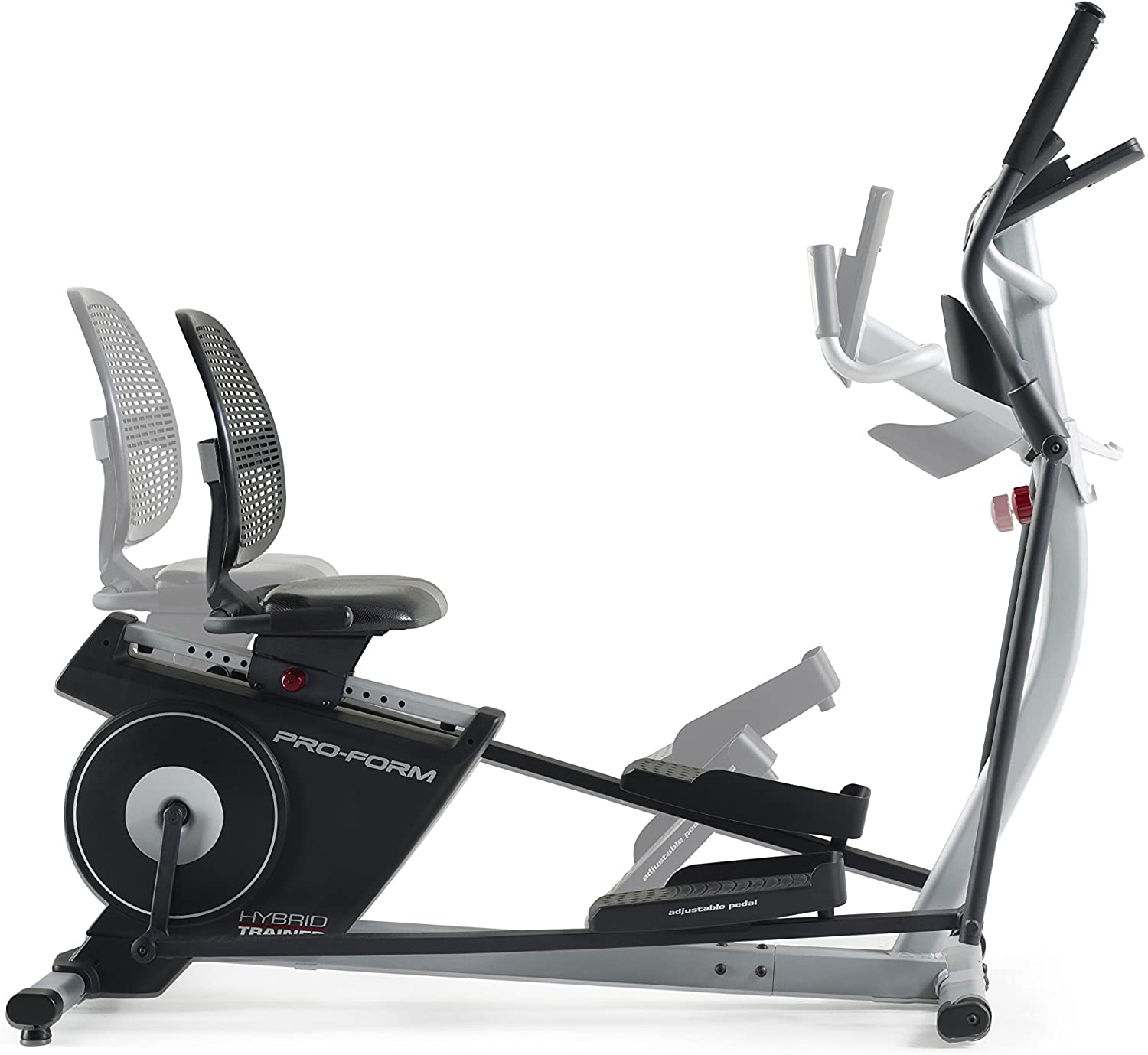
Product Highlights
- Easily adjusted to fit different body sizes
- 14 preset workouts
- Ability to work upper and lower body muscle groups
- Simple assembly
- Priced under $1,000
Pros & Cons
Pros
- 2-in-1 low impact cardio machine
- Affordable at well under $1,000
- Adjustable screen for viewing while on the elliptical or bike
- Interactive programming with iFIT
Cons
- 15-inch elliptical stride may be uncomfortable for taller users
- Storing machine in non-climate-controlled spaces voids the warranty
- Some returns could incur a $250 fee
Bottom Line
The ProForm Hybrid Trainer XT offers up a recumbent exercise bike and elliptical in one piece of equipment.
We really like this bike for its versatility—it’s part recumbent exercise bike, part elliptical, providing cardio options depending on your needs. The Hybrid Trainer syncs with iFIT programming to provide countless options for streaming workouts from your own smart device.
Read our full ProForm Hybrid Trainer review.
What Is An Upright Bike?
An upright bike requires riders to sit in an upright position and pedal. Pedals are located under the hips in an upright bike versus in a legs-forward position on a recumbent bike. Upright bicycles offer a wide variety of options to fit any budget and technology preference. They’re suitable for beginners, too, so don’t worry about your fitness level.
There are different types of exercise bikes that fall under the upright bike category:
Stationary Bike
An upright stationary bike offers a tall upright seat more comparable to a beach cruiser bicycle, plus features pedals directly under the hips.
Air Bikes
Air bikes are stationary bikes that sit upright and use a fan blade to create resistance. Most air bikes, like the Rogue Echo Bike, feature handlebars that also attach to the fan blade, which means your arms and legs can both be in motion for a unique full-body biking experience. The use of a fan to create resistance means that the faster you pedal and work your arms, the more resistance you work against.
Studio Cycle Bikes
Studio cycle bikes are the type of bike you’ll find in an indoor cycling class where the instructor has riders change the resistance via a knob. Resistance can be friction-based or magnetic-based. Magnetic resistance tends to produce a smoother ride—and requires less maintenance—but is more expensive than a friction resistance system.
Between the rising popularity of cycling classes and Peloton’s dominance in this arena, this type of bike is more popular than ever. They can get pricey, though.The good news is that there are alternatives to pricey Peloton equipment and subscriptions.
Pros:
- Low-impact but still recruits muscles full body, including abdominal muscles
- Option of riding standing or sitting
- Typically a smaller footprint than a recumbent bike
- Foldable options are common
Cons:
- Bike seat can be more uncomfortable than the larger seat on a recumbent bike
- May be hard to get on and off if you have mobility issues
Best For:
Garage gym owners of any skill level can benefit from an upright exercise bike. With a few different subcategories to choose from, you will likely find something that fits your needs.
Upright Bikes We Recommend:
We know our exercise bikes, and our expert product testers have a few favorite upright bikes.
NordicTrack S22i
NordicTrack S22i
NordicTrack S22i Studio Bike
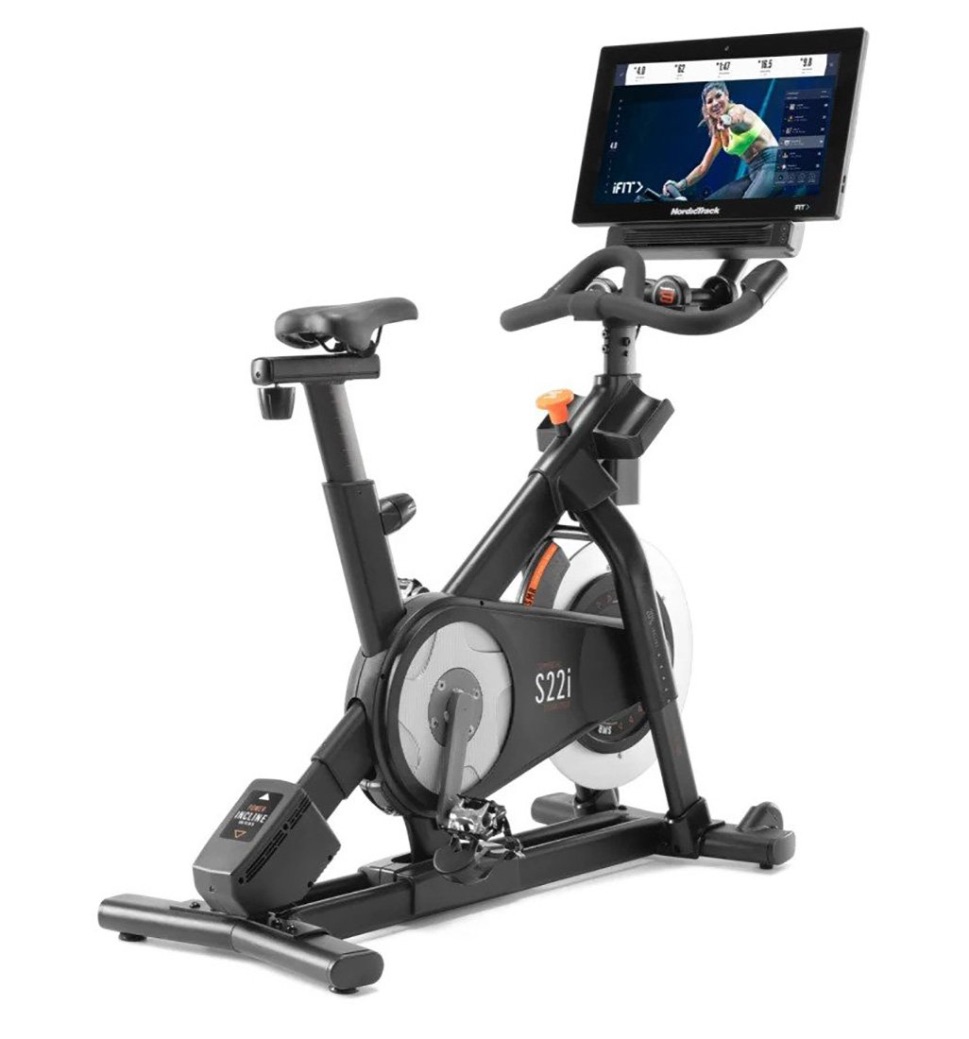
Product Highlights
- 24 digital resistance levels
- Incline and decline adjustments
- Fully rotating touchscreen
Pros & Cons
Pros
- Large 22" smart HD touchscreen
- Incline and decline ability
- Compatible with iFIT
- Adjustable seat
- Adjustable handles
- Dual-sided pedals
- Fan
- Comes with 2 3-lb dumbbells
- 24 digital resistance levels
Cons
- Expensive
- iFIT membership not necessary, but most beneficial
- Difficult to assemble
- Can’t be stored in the garage (brand states doing so will void the bike’s warranty)
- Hard to move and weighs more than 200 pounds
Bottom Line
This is the bike to get if you want an indoor cycling bike with interactive programming, incline and decline capabilities, and all the extras.
With a 22-inch rotating touchscreen, iFIT programming, and incline and decline training, the NordicTrack S22i provides one of the best overall studio cycle experiences.
Read our full review of the NordicTrack S22i.
Rogue Echo Bike
Rogue Echo Bike
Rogue Echo Bike
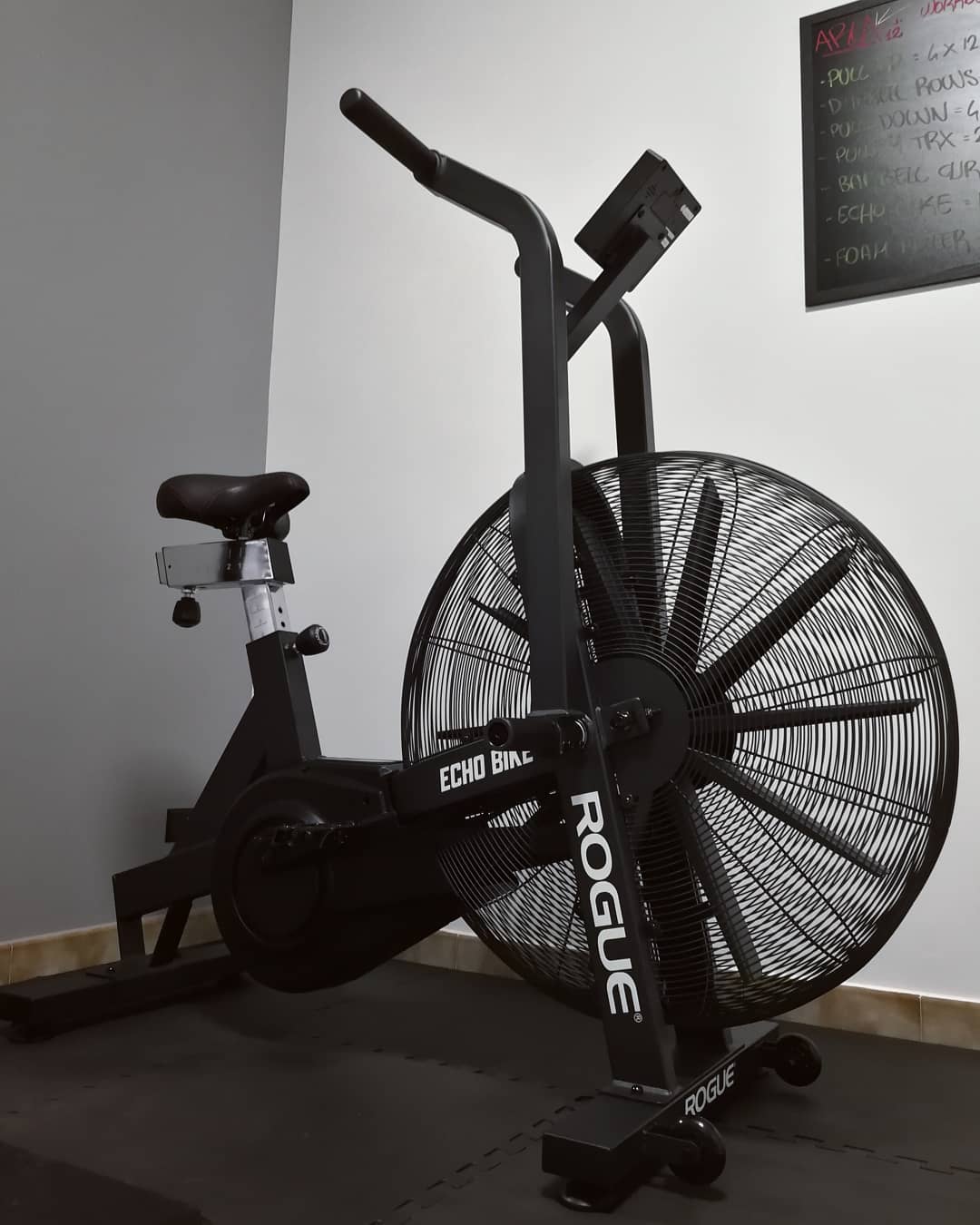
Product Highlights
- Heavy duty steel
- Overbuilt for smooth ride
- 350 lb weight limit
- Solid foundation for max outs
- Easily portable
Pros & Cons
Pros
- Extremely durable, beefy construction
- Very little rocking or side-to-side movement
- Black powder-coated metal on almost everything
- Belt-driven fan for much less maintenance.
- Easy-to-read LCD console screen
- Legs feature adjustable leveling feet
- Somewhat compact
- Oversized, heavy-duty front wheels
- Sleek, attractive look
Cons
- Larger than other stationary bikes
- Belt drive is overall harder to push than a chain drive
- Not the cheapest air bike on the market
Bottom Line
We’ve tested just about every air bike on the market, and the Echo combines many of our favorite features into one. The belt drive is much more durable and requires less maintenance than a chain drive. The size and weight make it extremely stable, and the price is much less than we’d expect for such a quality piece of equipment.
Our pick for best air bike, the Rogue Echo has a low-maintenance belt drive system, heavy-duty steel construction, and is simple to assemble.
Read our full review of the Rogue Echo Bike.
Sunny Health & Fitness Belt Drive Indoor Cycling Bike
Sunny Health and Fitness SF-B1002 Belt Drive Indoor Cycling Trainer
Sunny Health and Fitness Indoor Cycle Bike SF-B1002
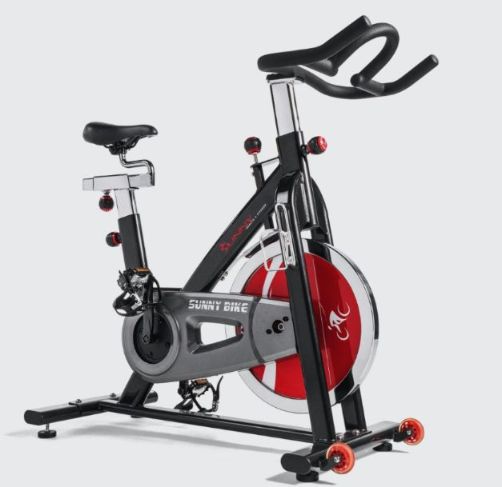
Product Highlights
- 49-lb flywheel
- 275-lb user weight capacity
- Stable
- Feels like road bicycle
- Under $300
Pros & Cons
Pros
- Priced under $400
- 49-pound flywheel provides a smooth ride
- Hundreds of micro levels of resistance adjusted manually
- Four-way adjustable seat and two-way adjustable multi-grip handlebars
- Conveniences like water bottle holder and transportation wheels
Cons
- Leather pad resistance will eventually require maintenance
- No monitor or display at all
- No tech compatibility
- No preset workouts
Bottom Line
A budget-friendly exercise bike that provides a good amount of bang for not too much buck.
Priced below $400, this bike is a budget-friendly option that provides hundreds of resistance micro adjustments, an adjustable seat and handlebars, and conveniences like a water bottle holder and wheels to transport.
Recumbent Bike vs Upright Bike: Which Is Better?
When comparing the upright vs recumbent bike, determining which bike is better will be a highly individualized choice depending on your fitness goals. Both options offer a low-impact cardio workout that also strengthens the knee and hip joints. Ultimately, it’s up to you on which riding position you prefer—for comfort, needs, and performance goals. The best piece of equipment is the one you want to use!
Also, we recommend talking to your physician before purchasing or using an exercise bike to gauge the best course of action for you as an individual. Every human body is different and the best piece of equipment for you is highly individualized.
RELATED: Recumbent Bike Workout
Which Bike Burns More Calories?
While indoor cycling overall has been shown to improve body composition, when it comes to upright bike vs recumbent bike and calorie burn, the upright bike has the upper hand—if we’re talking about the same amount of time in the saddle at the same intensity level. That being said, it’s hard to maintain the same intensity on a recumbent bike as you would on an upright bike.
All other factors the same though, the upright bike does require more muscle recruitment, specifically the core muscles.
“The more muscle stimulus your body undergoes, the harder the exercise becomes, and this leads to overall greater caloric expenditure,” Nicole explains.
FAQs About Recumbent Bike vs Upright Bike
Is an upright bike better than a recumbent bike?
In a debate between the recumbent bike vs upright bike, neither is objectively better or worse. The best bike for you will depend on what you’re looking to gain from an exercise bike. For example, if you’re planning to train for road biking, you will want an exercise bike that most accurately represents your position on that road bike. If you suffer from injuries, like back pain, or need a very low-impact option, a recumbent bike could be the better choice.
Is a recumbent bike good for weight loss?
A recumbent bike is not inherently good or bad for weight loss. And, if you’re looking to an exercise bike to lose weight, also ensure that you’re focused on what you eat as well. While exercise is an important part of the equation and can help burn calories, nutrition plays an even bigger role. If you aren’t consuming a proper diet for your goals, a recumbent bike won’t make or break your weight loss progress. It can certainly support it, though, with the right food choices.
Can I get a good workout on a recumbent bike?
Yes. With your glutes, core, and back fully supported, you’re left with an efficient way to target the leg muscles. The quadriceps and hamstrings are the largest group of muscles in the legs, so adjusting the resistance level or your speed to challenge yourself can provide a great workout.
Which bike is better for people with knee pain?
The good news is that both the upright bike and the recumbent bike offer low-impact solutions for the knee joint. As far as cardiovascular exercise equipment is concerned, either option will be a safe solution if you need a piece of cardio equipment for bad knees. If you experience chronic knee pain, speak with your primary care provider to help develop a plan to rehabilitate the aching joint.


